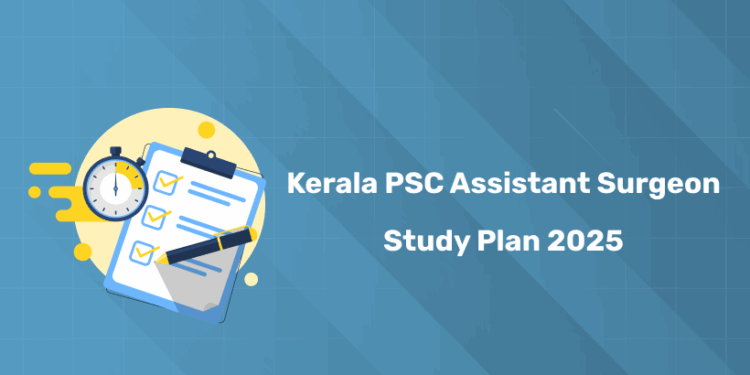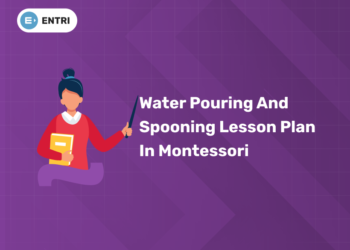Table of Contents
Creating a clear study plan is essential for any written examination. A good plan outlines your preparation strategy, covers the detailed syllabus, and takes the exam pattern into account. In this blog, we have attached a Kerala PSC Assistant Surgeon Study Plan 2025 that provides effective tips, tricks, and a structured approach to help candidates organize their preparation and maximize their chances of success. Explore it now!
Kerala PSC Assistant Surgeon Recruitment 2025 Overview
| Particulars | Details |
| Name of recruiting organization | Kerala Public Service Commission (PSC) |
| Name of department | Health Services |
| Name of post | Assistant Surgeon/ Casualty Medical Officer |
| Category No. | 177/2025 |
| Number of vacancies | Anticipated |
| Official website | keralapsc.gov.in |
| Mode of application | Online |
| Mode of recruitment | Direct Recruitment |
Kerala PSC Assistant Surgeon Previous Year Question Paper – PDF
1: Which Year First Assembly Election was held in Kerala?
| Year | PDF Link |
| 2015 | |
| 2016 | |
| 2018 | |
| 2020 | |
| 2021 | |
| 2023 | |
| 2024 | |
| 2023 | |
| 2022 | |
| 2021 | |
| 2020 |
Enroll in Kerala's Top-rated Kerala PSC Coaching Program!
സർക്കാർ ജോലി എന്ന സ്വപ്നം ഇനി സ്വപ്നം മാത്രമല്ല! Join Entri's Kerala PSC Coaching Programs
Join Now!Kerala PSC Assistant Surgeon 2025 Syllabus PDF
To help candidates prepare effectively for the Kerala PSC Assistant Surgeon examination 2025, we have created a detailed study plan covering all subjects and topics included in the syllabus. You can download the complete syllabus PDF from the link below and use it alongside the 30-day study schedule to organize your preparation.
Kerala PSC Assistant Surgeon Study Plan 2025: Monthly
Follow this month-wise Kerala PSC Assistant Surgeon Study Plan 2025 to cover the syllabus systematically and track your preparation for better results.
1st Month
| Week | Day | Subject | Topics |
|---|---|---|---|
| Week 1: Human Anatomy | Day 1 | Anatomy | General Anatomy, General Embryology |
| Day 2 | Anatomy | Upper Limb, Lower Limb | |
| Day 3 | Anatomy | Thorax, Head and Neck | |
| Day 4 | Anatomy | Brain and Spinal Cord, Abdomen, Pelvis, Perineum | |
| Day 5 | Anatomy | Genetics, Revision of Week 1 | |
| Day 6 | Anatomy | Mock Test: Anatomy, Identify Weak Topics | |
| Day 7 | Anatomy | Revise Weak Topics, Practice Diagrams | |
| Week 2: Biochemistry | Day 8 | Biochemistry | Proteins, Carbohydrates |
| Day 9 | Biochemistry | Lipids, Metabolism of Lipids, Metabolism of Amino Acids | |
| Day 10 | Biochemistry | Haemoglobin, Vitamins, Mineral Metabolism, Homeostasis | |
| Day 11 | Biochemistry | Nucleic Acids & Molecular Biology, Plasma Proteins & Immunoglobulins | |
| Day 12 | Biochemistry | Biochemistry of Cancer, Clinical Chemistry | |
| Day 13 | Biochemistry | Mock Test: Biochemistry, Revise Mistakes | |
| Day 14 | Biochemistry | Quick Revision of All Topics | |
| Week 3: Physiology (Including Bio-Physics) | Day 15 | Physiology | Hematology, Cardiovascular System |
| Day 16 | Physiology | Respiratory System, Gastrointestinal System | |
| Day 17 | Physiology | Renal System, Skin & Temperature Regulation | |
| Day 18 | Physiology | Nerve-Muscle Physiology, Nervous System | |
| Day 19 | Physiology | Special Senses, Audition, Endocrinology | |
| Day 20 | Physiology | Physiology of Reproduction, Mock Test: Physiology | |
| Day 21 | Physiology | Revise Weak Areas | |
| Week 4: Forensic Medicine | Day 22 | Forensic Medicine | Introduction, Inquest Procedures, Courts, Witnesses |
| Day 23 | Forensic Medicine | Medical Certificates, Death & Identification | |
| Day 24 | Forensic Medicine | Medico-Legal Autopsy, Mechanical & Regional Injuries | |
| Day 25 | Forensic Medicine | Asphyxial Deaths, Starvation, Sexual Functions | |
| Day 26 | Forensic Medicine | Infant & Childhood Deaths, Biological Fluids | |
| Day 27 | Forensic Medicine | Forensic Psychiatry, Medical Jurisprudence | |
| Day 28 | Forensic Medicine | Forensic Toxicology: Poisons, Drug Abuse, Mechanical & War Agents | |
| Day 29 | Forensic Medicine | Mock Test: Forensic Medicine, Identify Weak Areas | |
| Day 30 | All Subjects | Full Syllabus Revision, Focus on Diagrams, Formulas, Medico-Legal Rules |
2nd Month
| Week | Day | Subject | Topics |
|---|---|---|---|
| Week 1: Microbiology – General & Systematic Bacteriology | Day 1 | Microbiology | Introduction, Morphology of Bacteria, Growth & Nutrition |
| Day 2 | Microbiology | Culture Media, Identification of Bacteria, Bacterial Genetics | |
| Day 3 | Microbiology | Antibacterial Agents, Antibiotic Sensitivity Test, Sterilization & Disinfection | |
| Day 4 | Microbiology | Infection – Sources & Spread, Response to Microbial Infection | |
| Day 5 | Microbiology | Gram Positive Cocci (Staphylococci, Streptococci, Pneumococci) | |
| Day 6 | Microbiology | Gram Negative Cocci (Neisseria), Gram Positive Bacilli (Corynebacterium, Listeria, Bacillus) | |
| Day 7 | Microbiology | Mycobacteria, Nocardia, Actinomyces, Clostridia & Non-sporing Anaerobes, Revision of Week 1 | |
| Week 2: Microbiology – Remaining Bacteria, Virology, Immunology | Day 8 | Microbiology | Gram Negative Bacilli (Haemophilus, Bordetella, Brucella, Enterobacteria/Yersinia) |
| Day 9 | Microbiology | Pseudomonas, Pasteurella, Vibrio/Campylobacter, Mycoplasma, Legionella, Rickettsia, Chlamydia | |
| Day 10 | Microbiology | Spirochetes, Revision of Systematic Bacteriology | |
| Day 11 | Virology | General Characteristics, Virus Host Interaction, Replication of Virus | |
| Day 12 | Virology | Poxvirus, Herpes, Adenovirus, Papova, Retrovirus, Myxoviruses | |
| Day 13 | Virology | Picornavirus, Hepatitis, Rhabdovirus, Arboviruses, Oncogenic Viruses, Bacteriophages | |
| Day 14 | Immunology | Introduction, Classification, Cells in Immunity, Antigens & Antibodies, Complement System | |
| Week 3: Immunology, Parasitology, Mycology, Pathology | Day 15 | Immunology | Hypersensitivity, HLA Antigens, Immunodeficiency, Serological Tests, Autoimmunity |
| Day 16 | Immunology | Tumour & Transplantation, Immunoprophylaxis & Immunotherapy, Revision | |
| Day 17 | Parasitology | Protozoal Infections, Laboratory Diagnosis | |
| Day 18 | Parasitology | Helminths – Intestinal, Tissue Nematodes, Cestodes, Trematodes | |
| Day 19 | Mycology | Introduction, Lab Diagnosis, Superficial Infections, Subcutaneous Infections | |
| Day 20 | Mycology | Systemic Mycoses, Opportunistic Fungi, Revision | |
| Day 21 | Pathology | Cell Injury, Infectious Diseases, Circulatory Disturbances, Growth Disturbances | |
| Week 4: Pathology, Pharmacology, Community Medicine | Day 22 | Pathology | Miscellaneous Disorders, Haematopathology, Cardiovascular & Respiratory Pathology |
| Day 23 | Pathology | Renal, GI Tract, Liver & Biliary Tract, Lymphoreticular System, Reproductive System | |
| Day 24 | Pathology | Osteopathology, Endocrine, Neuropathology, Dermato-pathology, Revision | |
| Day 25 | Pharmacology | General Pharmacology, Clinical Pharmacology, Autonomic Nervous System, Autacoids | |
| Day 26 | Pharmacology | CNS Drugs, Cardiovascular Drugs, Drugs Affecting Blood & Respiration | |
| Day 27 | Community Medicine | Health Concepts, Public Health Evolution, Determinants of Health, Prevention & Control | |
| Day 28 | Community Medicine | Social & Behavioral Sciences, Doctor-Patient Relationship, Ethics, Life Skills, Gender & Health | |
| Day 29 | Community Medicine | Environment & Health, Water, Air, Noise, Radiation Pollution, Vector Control, Waste Management | |
| Day 30 | Community Medicine | Nutrition, Occupational Health, Epidemiology, Reproductive & Child Health, Health Care System, Disaster Management, Revision of Full Syllabus |
3rd Month
| Day | Topics |
|---|---|
| 1 | Acute conjunctivitis, Trachoma, Allergic conjunctivitis, Pinguecula, Pterygium |
| 2 | Xerosis/Bitot spots, Dry eye, Angular & neonatal conjunctivitis, Subconjunctival hemorrhage |
| 3 | Chronic conjunctivitis, Membranous & inclusion conjunctivitis, Corneal inflammations overview |
| 4 | Corneal ulcers (bacterial, fungal, viral), Mooren’s ulcer, Keratomalacia, Vitamin A deficiency |
| 5 | Exposure keratitis, Neuroparalytic keratitis, Corneal blindness, Eye banking, Eye donation |
| 6 | Scleritis, Episcleritis, Iridocyclitis, Panophthalmitis, Endophthalmitis, Uveitis systemic associations |
| 7 | Coloboma iris, Ocular albinism, Vitreous hemorrhage, Synchisis scintillans, Asteroid hyalosis |
| 8 | Glaucoma: Angle closure, Open angle, Steroid induced, Lens induced, Cataract & management |
| 9 | Fundus changes: Diabetes, Hypertension, Anaemias, PIH, Haematological disorders, Myopia, Photocoagulation |
| 10 | Retinal vascular diseases, CRAO, CRVO, Retinal detachment, ROP, Retinitis pigmentosa, Retinoblastoma, Papilledema, Optic neuritis/atrophy |
| 11 | Amblyopia awareness, Types of squint, Proptosis, Orbital cellulitis, Cavernous sinus thrombosis |
| 12 | Dacryocystitis (congenital, acute, chronic), Epiphora, Ectropion, Entropion, Trichiasis, Ptosis, Lagophthalmos, Symblepharon |
| 13 | Blepharitis, Chalazion, Refractive errors (myopia, hypermetropia, astigmatism, presbyopia, aphakia/pseudophakia, anisometropia) |
| 14 | Keratorefractive surgery overview, Chemical injuries, Open/Closed globe injuries, Sympathetic injuries, Siderosis bulbi, Chalcosis, Medico-legal aspects |
| 15 | Blindness: Definition, Types, Causes, Eye donation promotion, NPCB, Vision 2020, Eye camps |
| 16 | Symptomatic disturbances of vision, Recent advances, Lasers in ophthalmology, Enucleation indications & technique, Eye & systemic diseases including AIDS |
| 17 | Sudden/partial/painless vision loss, Ocular malignancy: Retinoblastoma, Choroid melanoma, Pharmacology (local anaesthetics, viscoelastics, steroids, NSAIDs, chronic systemic drug effects) |
| 18 | ENT: External ear diseases (wax, otomycosis, foreign body, keratosis, malignant otitis externa) |
| 19 | Middle ear: Acute otitis media, OME, CSOM (TTD, AAD, complications), Deafness: Classification, Causes, Investigations, Early detection, Rehabilitation |
| 20 | Inner ear: Vertigo (classification, causes, investigations, management), Meniere’s disease, Positional vertigo, Acoustic neuroma |
| 21 | Nose & paranasal sinuses: Rhinitis (allergic, atrophic, allergic fungal), Acute & chronic sinusitis, Complications |
| 22 | Facio-maxillary injuries, Epistaxis, DNS, Nasal polyp, FESS, Tumours of nose & PNS (inverted papilloma, nasopharyngeal angiofibroma, malignancy) |
| 23 | Throat: Tonsils & adenoids, Quinsy, Oral patches, Neck space infections (Ludwig’s angina, retropharyngeal & parapharyngeal abscess) |
| 24 | Hoarseness, Stridor, Malignant lesions of larynx & laryngopharynx, Dysphagia, Foreign bodies, Endoscopies in ENT |
| 25 | Medicine: Nutrition & nutritional disorders, Protein-calorie malnutrition, Obesity, Vitamin deficiencies & excess, Hypo/Hypervitaminosis A & D |
| 26 | Fluid & electrolyte balance (hypovolemia, dehydration, acidosis, alkalosis, hypo/hypernatremia, hypo/hyperkalemia), Temperature disturbances, Infections, PUO, Immunology (B/T cells, antibodies, hypersensitivity) |
| 27 | Genetics (clinical), Primary immunodeficiency disorders, Environmental & occupational problems, Medical disorders in pregnancy |
| 28 | CVS: Coronary artery disease, Hypertension, Heart failure, Rheumatic heart disease, Congenital heart disease, Cardiomyopathies, Pericardial disease, DVT/PE |
| 29 | GI: Jaundice, Ascites, Acid-peptic disease, Malabsorption, Tropical sprue, Drug-induced hepatitis, IBS, IBD, Abdominal TB, Chronic liver disease, GI bleed |
| 30 | CNS: Migraine, Seizures, Stroke, Extrapyramidal disorders, Peripheral neuropathy, Spinal cord disorders, MND, Myasthenia, CNS TB, Demyelination, Cerebellar disorders, Dementia, Delirium, Pituitary disorders; Psychiatry overview (Classification, Clinical interview, Mood & psychotic disorders, Neurotic/stress disorders, Sleep, Legal aspects, Treatment) |
4th Month
| Day | Topics |
|---|---|
| 1 | Radiology: Production of X-rays, Biological effects; Dermatology: Skin infections, Eczematous dermatitis |
| 2 | Radiology: Skeletal radiology, Chest & Mediastinum; Dermatology: Bullous skin lesions, Collagen disorders |
| 3 | Radiology: GI system imaging; Dermatology: Pigmentary disturbances, Maculopapular lesions |
| 4 | Radiology: Hepatobiliary system; Dermatology: Squamous lesions, Neoplastic lesions |
| 5 | Radiology: Genitourinary system; Dermatology: Lesions of skin appendages, Gastrogenic disorders |
| 6 | Radiology: Neuroimaging modalities; Dermatology: Leprosy & National Leprosy Control Programme |
| 7 | Radiology: Emergency radiology; Surgery: Principles of Surgery, Genetics, Surgical ethics, History |
| 8 | Surgery: Trauma, Metabolic response to trauma, Wound healing & complications |
| 9 | Surgery: Critically injured patient, ATLS, Polytrauma, Disaster management |
| 10 | Surgery: Wounds & management, Shock, Hemorrhage, Hemostasis, Blood transfusion, Burns |
| 11 | Surgery: Fluid & electrolyte balance, Nutritional support, Pre/post-operative care, Sterilization |
| 12 | Surgery: Surgical sepsis, Nosocomial infection, Antibiotic policy, Immunology & organ transplantation, HIV/Hep B |
| 13 | Surgery: Principles of imaging, Suture materials & anastomosis, Skin & soft tissue surgery |
| 14 | Surgery: Arteries & veins – anatomy, trauma, acute/chronic ischemia, aneurysms, DVT, venous ulcers |
| 15 | Surgery: Lymphatics & lymph nodes – anatomy, lymph edema, lymph cysts, inflammations, lymphomas |
| 16 | Surgery: Head & neck – injuries, faciomaxillary trauma, salivary glands, cleft lip/palate, oral cancers, jaw tumors |
| 17 | Surgery: Thyroid & parathyroid, Breast surgery, Chest: diaphragm, mediastinum, injuries, pleura & lungs |
| 18 | Surgery: GI tract – esophagus, stomach & duodenum, liver, biliary system, spleen, pancreas, appendix |
| 19 | Surgery: Small & large intestine, rectum & anal canal, abdominal trauma, minimally invasive surgery, peritoneum, hernia, mesentery |
| 20 | Surgery: Genitourinary system – congenital, trauma, stones, infections, tumors, prostate, adrenal surgery |
| 21 | Orthopaedics: Fractures – definitions, types, general principles, complications; Clavicle, Humerus, Shoulder |
| 22 | Orthopaedics: Elbow & forearm fractures, Monteggia & Galeazzi, Colles & Scaphoid, Spine, Pelvis & Hip fractures |
| 23 | Orthopaedics: Knee, Leg, Ankle, Hand, Foot, Cold orthopaedics – CTEV, Flat foot, CDH, Torticollis |
| 24 | Orthopaedics: Osteomyelitis, Septic arthritis, Tuberculosis, Perthes disease, SUFE, Rickets, Osteomalacia, Arthritis |
| 25 | Orthopaedics: Intervertebral disc prolapse, Scoliosis, Spondylolisthesis, Bone tumors, Nerve injuries, Amputations |
| 26 | PMR: Introduction, Disability evaluation, Impairment/disability concepts, Physical therapy principles, Therapeutic exercises |
| 27 | PMR: Occupational therapy, Prosthetics & aids, Community-based rehab, Pain management, Certification & social-vocational rehab |
| 28 | Radiotherapy: Cancer epidemiology, Screening, Chemotherapy principles, Hormone therapy, Radiotherapy methods & recent advances |
| 29 | Anaesthesiology: Introduction, Pre-anaesthetic check-up, Premedication, General & regional anesthesia, Equipment, Oxygen therapy, IV fluids, Monitoring |
| 30 | Paediatrics: Infections, GI & liver disorders, CVS, Respiratory, CNS, Hemopoietic, Kidney, Endocrine, Connective tissue disorders, Malignancies, Neonatal care, Nutrition, National programmes, Genetics, Behaviour & accidents |
5th Month
| Day | Topics |
|---|---|
| Day 1 | Diagnosis of pregnancy: clinical features, differential diagnosis; Principles of pregnancy tests |
| Day 2 | Antenatal care: objectives, routine checkups, assessment of gestational age; Obstetric & general examination |
| Day 3 | Clinical monitoring of maternal & fetal wellbeing; Detection of abnormalities |
| Day 4 | Common problems in pregnancy: edema, pruritis, heartburn, piles, varicose veins; Lifestyle, exercise, hygiene, nutrition, rest |
| Day 5 | Drugs in pregnancy: safe medications, immunization, blood and urine tests interpretation |
| Day 6 | Ultrasound examination in pregnancy; Fetal surveillance methods |
| Day 7 | Revision & practice questions on Week 1 topics |
| Day 8 | Normal labour: physiology, fetal skull & pelvis, mechanism of labour |
| Day 9 | Labour monitoring: partogram, analgesia; Induction & acceleration of labour: methods, drugs, pros & cons |
| Day 10 | Delivery stages: first & second stage management; Episiotomy: indications & steps |
| Day 11 | Third stage of labour: active management, PPH prevention & management |
| Day 12 | Abnormal labour: hypertonic, hypotonic, incoordinate uterine action; CPD, obstructed labour |
| Day 13 | Caesarean section: indications, complications; Vaginal delivery after caesarean |
| Day 14 | Revision & practice questions on Week 2 topics |
| Day 15 | Abnormal presentations: occipito-posterior, breech, transverse, brow/face |
| Day 16 | Abortions: types, causes, investigations, management; Recurrent pregnancy loss |
| Day 17 | Ectopic pregnancy: diagnosis, management; Trophoblastic diseases |
| Day 18 | Hyperemesis gravidarum; Abnormal puerperium |
| Day 19 | Multiple pregnancies, IUD, PROM, preterm labour, post-datism; IUGR, elderly primigravida, grand multipara |
| Day 20 | Fetus & newborn care: fetal distress, neonatal resuscitation; Examination, congenital anomalies, jaundice, breastfeeding |
| Day 21 | Revision & practice questions on Week 3 topics |
| Day 22 | Abnormal menstruation, amenorrhea; Dysfunctional uterine bleeding, postmenopausal bleeding |
| Day 23 | Hormonal therapy: indications, contraindications, complications; Infertility: evaluation, ART basics |
| Day 24 | Genital infections: STDs, PID, HIV, genital TB; Genital injuries including fistulae |
| Day 25 | Neoplasms of genital tract: benign, malignant, cancer screening; Endometriosis: diagnosis, management |
| Day 26 | Operative gynaecology: D&C, cervical biopsy, MTP, tubal ligation; Hysterectomy, ovarian tumors, laparoscopy, hysteroscopy, colposcopy |
| Day 27 | Post-operative management in OBG; Acute abdomen & adolescent gynaecology; Analgesia & urological problems |
| Day 28 | Family Welfare: Mechanical methods (IUCD, tubectomy, condom, vasectomy); Rhythm method, safe period, oral contraceptives |
| Day 29 | Pharmacology of contraceptives: mode of action, administration, side effects, contraindications; Community & pediatric aspects of family planning |
| Day 30 | Revision of entire syllabus + practice MCQs/clinical cases |
Kerala PSC Assistant Surgeon Study Tips 2025
There is a list of tips and tricks that candidates must follow in order to successfully prepare for the written examination for the vacancy of Assistant Surgeon in the Kerala Public Service Commission. Below is a list of tips that candidates can follow to improve their chances of qualifying and to create a reliable Kerala PSC Assistant Surgeon Study Plan 2025.
- Develop a timetable that includes all subjects and topics of the examination syllabus.
- Allocate appropriate time to each subject to ensure thorough preparation.
- Take proper breaks between study sessions to avoid burnout and overlapping learning.
- Attend sample workshops and solve mock tests online to get familiar with the examination pattern.
- Review previous years’ question papers to understand the types of questions asked and important topics.











